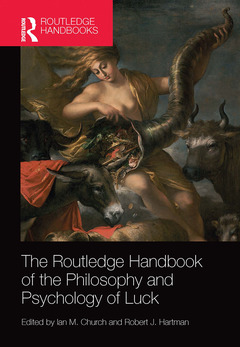The Routledge Handbook of the Philosophy and Psychology of Luck Routledge Handbooks in Philosophy Series
Coordonnateurs : Church Ian M., Hartman Robert J.

Luck permeates our lives, and this raises a number of pressing questions: What is luck? When we attribute luck to people, circumstances, or events, what are we attributing? Do we have any obligations to mitigate the harms done to people who are less fortunate? And to what extent is deserving praise or blame affected by good or bad luck? Although acquiring a true belief by an uneducated guess involves a kind of luck that precludes knowledge, does all luck undermine knowledge? The academic literature has seengrowing, interdisciplinary interest in luck, and this volume brings together and explains the most important areas of this research. It consists of 39 newly commissioned chapters, written by an internationally acclaimed team of philosophers and psychologists, for a readership of students and researchers. Its coverage is divided into six sections:
I: The History of Luck
II: The Nature of Luck
III: Moral Luck
IV: Epistemic Luck
V: The Psychology of Luck
VI: Future Research.
The chapters cover a wide range of topics, from the problem of moral luck, to anti-luck epistemology, to the relationship between luck attributions and cognitive biases, to meta-questions regarding the nature of luck itself, to a range of other theoretical and empirical questions. By bringing this research together, the Handbook serves as both a touchstone for understanding the relevant issues and a first port of call for future research on luck.
Section I: History of Luck
- Nafsika Athanassoulis: Aristotle on Constitutive, Developmental, and Resultant Moral Luck
- Sarah Broadie: Aristotle on Luck, Happiness, and Solon’s Dictum
- René Brouwer: The Stoics on Luck
- Jeffrey Hause: Thomas Aquinas on Moral Luck
- Kate Moran: Immanuel Kant on Moral Luck
- Craig Smith: Adam Smith on Moral Luck and the Invisible Hand
- Piers Norris Turner: John Stuart Mill on Luck and Distributive Justice
- Dani Rabinowitz: History of Luck in Epistemology
- Andrew Latus: Thomas Nagel and Bernard Williams on Moral Luck
- Duncan Pritchard: Modal Accounts of Luck
- Wayne Riggs: The Lack of Control Account of Luck
- Nicholas Rescher: The Probability Account of Luck
- Rik Peels: The Mixed Account of Luck
- Nathan Ballantyne & Samuel Kampa: Luck and Significance
- Fernando Broncano-Berrocal: Luck as Risk
- Rachel Mckinnon: Luck and Norms
- Daniel Statman: The Definition of ‘Luck’ and the Problem of Moral Luck
- Carolina Sartorio: Kinds of Moral Luck
- Michael J. Zimmerman: Denying Moral Luck
- Robert J. Hartman: Accepting Moral Luck
- Laura W. Ekstrom: Luck and Libertarianism
- Mirja Pérez de Calleja: Luck and Compatibilism
- Ian M. Church: The Gettier Problem
- Benjamin Jarvis: The Problem of Environmental Luck
- Tim Black: Anti-Luck Epistemology
- Stephen Hetherington: The Luck/Knowledge Incompatibility Thesis
- John Greco: Luck and Skepticism
- J. Adam Carter: Epistemic Luck and the Extended Mind
- Steven D. Hales & Jennifer Adrienne Johnson: Cognitive Biases and Dispositions in Luck Attributions
- Karl Halvor Teigen: Luck and Risk
- Sabine Roeser: Emotional Responses to Luck, Risk and Uncertainty
- Anastasia Ejova: The Illusion of Control
- Matthew D. Smith & Piers Worth: Positive Psychology and Luck Experiences
- J. D. Trout: Luck in Science
- Joe Milburn & Edouard Machery: The Philosophy of Luck and Experimental Philosophy
- Ori J. Herstein: Legal Luck
- Carolyn McLeod & Jody Tomchishen: Feminist Approaches to Moral Luck
Section II: The Nature of Luck
Section III: Moral Luck
Section IV: Epistemic Luck
Section V: The Psychology of Luck
Section VI: Future Research
Ian M. Church is Assistant Professor of Philosophy at Hillsdale College. He is the co-author (with Peter Samuelson) of Intellectual Humility: An Introduction to the Philosophy & Science (2017).
Robert J. Hartman is a Postdoctoral Research Fellow with the Lund-Gothenburg Responsibility Project at the University of Gothenburg, Sweden. He is the author of In Defense of Moral Luck: Why Luck Often Affects Praiseworthiness and Blameworthiness (2017).
Date de parution : 12-2020
17.8x25.4 cm
Date de parution : 02-2019
17.8x25.4 cm
Thème de The Routledge Handbook of the Philosophy and Psychology... :
Mots-clés :
Moral Luck; Good Life; Circumstantial Moral Luck; Vice Versa; Constitutive Moral Luck; Error Theory; Epistemic Luck; Constitutive Luck; Gettier Cases; Lucky Events; Relevant Initial Conditions; Modal Account; Violate; Resultant Luck; Moral Luck Debate; Environmental Luck; Fake Barn Cases; Gettier Problem; Objective Luck; Safety Theories; Gettier’s Counterexamples; Fake Barn; True Belief; Bad Luck; Luck Attributions



